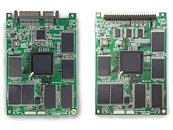Wednesday, May 9th 2012

Buffalo Readies New Line of SSDs with MRAM Caches
Buffalo launched a new line of SSDs that incorporate MRAM (magnetic random access memory) caches. The caches provide increase tolerance to power loss, and momentarily hold data that's being transacted between the drive and the host, which buys the controller some time to prevent data loss, when the power goes down. Pictures suggest that Buffalo could have SSDs in both SATA and IDE flavors. So far, MRAM cache is the only distinctive feature of a new line of SSDs Buffalo is working on, which it will unveil a little later, at the Embedded Systems Expo (ESEC) 2012.
Source:
Hermitage Akihabara

7 Comments on Buffalo Readies New Line of SSDs with MRAM Caches
But I want an SSD based on MRAM only and no NAND. With an optical interface.
Gimme.
Why the battery? MRAM is non-volatile.What? You'd not like several orders of magnitude lower system memory latencies, instant boot-up, lower power than DRAM?